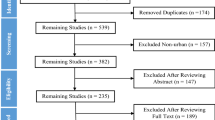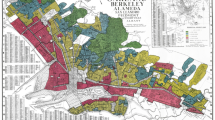Abstract
In this article, we discuss an appropriate methodology for assessing complex urban programs such as the WHO European Healthy Cities Network. The basic tenets and parameters for this project are reviewed, and situated in the broader urban health tradition. This leads to a delineation of the types of questions researchers can address when looking at a complex urban health program. Such questions reach appropriately beyond traditional public health concepts involving proximal and distal determinants of health (and associated upstream, midstream, and downstream rhetoric). Espousing a multi-level, reciprocal pathways perspective on Healthy Cities research, we also adopt a distinction between impacts and outcomes of Healthy Cities. The former are value-driven, the latter intervention-driven. These approaches lead to the acknowledgment of a logic of method that includes situational and contextual appreciation of unique Healthy City experiences in a Realist Evaluation paradigm. The article concludes with a reflection of evaluation and assessment procedures applied to Phase IV (2003-2008) of the WHO European Healthy Cities Network and an interpretation of response rates to the range of methods that have been adopted.




Similar content being viewed by others
Notes
In some official WHO documentation, a total of 79 cities participating in Phase Four is mentioned. Two cities withdrew from the project early. Research instruments were thus sent out to a total of 77 cities.
References
de Leeuw E. Evidence for Healthy Cities: reflections on practice, method and theory. Health Promotion International. 2009;24(S1):i19–i36 doi:10.1093/heapro/dap052
WHO Healthy City Project Technical Working Group on City Health Profiles. City Health Profiles: How to Report on Health in Your City. Copenhagen, Denmark: WHO/EURO; 1994.
Mitroff II, Mason R. Structuring ill-structured policy issues: further explorations in a methodology for messy problems. Strateg Manag. 1980; 23.
Lawrence R. Building Healthy Cities. The World Health Organization Perspective. Ch. 24. In: Galeo S, Vlahov D, eds. Handbook of Urban Health. Populations, Methods, and Practice. New York, NY: Springer; 2005: 479–501.
Hancock T, Duhl L. Promoting Health in the Urban Context. WHO Healthy Cities Papers No. 1. Copenhagen, Denmark: FADL Publishers; 1988.
de Leeuw E. Policies for Health. The Effectiveness of Their Development, Adoption, and Implementation. Chapter 5. In: McQueen D, Jones CM, eds. (2007) Global Perspectives on Health Promotion Effectiveness. New York, NY: Springer; 2007: 51–66.
Dooris M, Poland B, Kolbe L, de Leeuw E, McCall DS, Wharf-Higgins J. Healthy Settings: Building Evidence for the Effectiveness of Whole System Health Promotion Challenges and Future Directions. Chapter 19. In: McQueen D, Jones CM, eds. Global Perspectives on Health Promotion Effectiveness. New York, NY: Springer; 2007: 327–352.
de Leeuw E, McNess A, Crisp B, Stagnitti K. Theoretical reflections on the nexus between research, policy and practice. Crit Public Health. 2008; 18(1): 5–20.
Webster P. City Health Profiles. Chapter 4. In: Green G, Tsouros A, eds. City Leadership for Health. Summary Evaluation of Phase IV of the WHO European Healthy Cities Network. Copenhagen, Denmark: World Health Organisation Regional Office for Europe; 2008: 8–9.
Sanderson D, Webster P. Healthy City Indicators. In: Tsouros A, Farrington J, eds. WHO Healthy Cities in Europe: a Compilation of Papers on Progress and Achievements. Copenhagen, Denmark: World Health Organisation Regional Office for Europe; 2003: 63–87.
Lawrence R. Urban health: an ecological perspective. Rev Environ Heal. 1999; 14(1): 1–10.
De Solla Price DJ. Science Since Babylon. New Haven, CT: Yale University Press; 1961.
Duhl LJ, Sanchez AK. Healthy Cities and the City Planning Process: a Background Document on Links Between Health and Urban Planning. Copenhagen, Denmark: WHO/EURO; 1999.
Frohlich KL, Potvin L. Transcending the known in public health practice: the inequality paradox: the population approach and vulnerable populations. Am J Publ Health. 2008; 98(2): 216–221.
Burris S, Hancock T, Lin V, Herzog A. Emerging strategies for healthy urban governance. J Urban Health. 2007; 84(1): 154–163.
Mitroff II, Featheringham TR. On systematic problem solving and the error of the third kind. Behav Sci. 1974; 19: 383–393.
Ratcliffe JW. Notions of validity in qualitative research methodology. Knowl Creation, Diff, Utilization. 1983; 5(2): 147–167.
de Leeuw E. Concepts in health promotion: the notion of relativism. Soc Sci Med. 1989; 29(11): 1281–1288.
Krieger N. Proximal, distal, and the politics of causation: what’s level got to do with it? Am J Publ Health. 2008; 98(2): 221–230.
Labonte R. Econology: integrating health and sustainable development. Part one: theory and background. Heal Promot Int. 1991; 6(1): 49–65.
Labonte R. Econology: integrating health and sustainable development. Guiding principles for decision makers. Heal Promot Int. 1991; 6(2): 147–156.
Corburn J. Street Science. Community Knowledge and Environmental Health Justice. Cambridge, MA: The MIT Press; 2005.
Corburn J. Reconnecting with Our Roots. American Urban Planning and Public Health in the Twenty-first Century. Urban Aff Rev. 2007; 42(5): 688–713.
Milio N. Promoting Health Through Public Policy. Ottawa, Canada: Canadian Public Health Association; 1986.
Ståhl T, Wismar M, Ollila E, Lahtinen E, Leppo K. Health in All Policies. Prospects and potentials. Helsinki, Finland: Finnish Ministry of Social Affairs and Health, under the auspices of the European Observatory on Health Systems and Policies; 2006.
European Monitoring Centre for Drugs and Drugs Addiction (2008) Prevention and Evaluation Resources Kit. European Union, EMCDDA. http://www.emcdda.europa.eu/html.cfm/index9729EN.html. Accessed August 1, 2008.
OECD/DAC. Glossary of Terms Used in Evaluations. Paris, France: OECD; 2002.
de Leeuw E, Skovgaard T. Utility-driven evidence for healthy cities: problems with evidence generation and application. Soc Sci Med. 2005; 61: 1331–1341.
Rychetnik L, Hawe P, Waters E, Barratt A, Frommer M. A glossary for evidence based public health. J Epidemiol Commun Health. 2004; 58: 538–545.
Duhl L, Hancock T. A Guide to Assessing Healthy Cities. WHO Healthy Cities Papers No. 3. Copenhagen, Denmark: WHO/EURO; 1988.
Goumans M, Springett J. From projects to policy: ‘Healthy Cities’ as a mechanism for policy change for health? Heal Promot Int. 1997; 12(4): 311–322.
Laverack G. Public Health. Power, Empowerment and Professional Practice. New York, NY: Palgrave MacMillan; 2005.
Wallerstein N. What Is the Evidence on Effectiveness of Empowerment to Improve Health? Copenhagen, Denmark: WHO/EURO; 2006.
Davidson S. Spinning the wheel of empowerment. Planning. 1998; 3: 14–15.
Anand S, Peter F, Sen A, eds. Public Health, Ethics, and Equity. Oxford, England: Oxford University Press; 2005.
Wismar M, Blau J, Ernst K, Figueras J. The Effectiveness of Health Impact Assessment. Scope and Limitations of Supporting Decision-Making in Europe. Brussels, Belgium: European Observatory on Health Systems and Policies; 2007.
Capello R. Il Paradigma delle Reti di Città: una Misura delle Esternalità di Rete Urbane. Economia Pubblica. 1999; 6: 41–68.
Capello R. The city-network paradigm: measuring urban network externalities. Urban Stud. 2000; 37(11): 1925–1945.
Worldwatch Institute. State of the World 2007: Our Urban Future. Washington, DC: Worldwatch Institute; 2006.
WHO Commission on Social Determinants of Health. Closing the Gap in a Generation. Health Equity Through Action on the Social Determinants of Health. Geneva, Switzerland: WHO; 2008.
Blas E, Gilson L, Kelly MP, et al. Addressing social determinants of health inequalities: what can the state and civil society do? Lancet. 2008; 372(9650): 1684–1689.
Pawson R, Tilley N. Realist Evaluation. Thousand Oaks, CA: Sage; 1997.
Pawson R. Evidence-Based Policy. A Realist Perspective. Thousand Oaks, CA: Sage; 2006.
Birckmayer JD, Weiss CH. Theory-based evaluation in practice: what do we learn? Eval Rev. 2000; 24(4): 407–431.
Hawe P, Degeling D, Hall J, eds. Evaluating Health Promotion: A Health Workers Guide. Sydney, Australia: Maclennan & Petty; 1990.
Jirojwong S, Liamputtong P, eds. Population Health, Communities and Health Promotion. South Melbourne, Australia: Oxford University Press; 2009.
Author information
Authors and Affiliations
Corresponding author
Rights and permissions
About this article
Cite this article
de Leeuw, E. Do Healthy Cities Work? A Logic of Method for Assessing Impact and Outcome of Healthy Cities. J Urban Health 89, 217–231 (2012). https://doi.org/10.1007/s11524-011-9617-y
Published:
Issue Date:
DOI: https://doi.org/10.1007/s11524-011-9617-y




